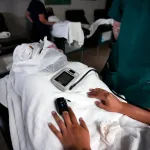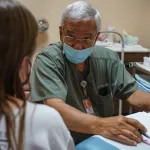For months, Trust Women had been gearing up for the federal abortion protections to disappear. They had a plan.
Staff at the Wichita-based abortion clinic had already had a taste of what it’s like to be a destination for abortions. For months, they had served patients from Texas and Oklahoma, which both banned the procedure at six weeks. Before May, Oklahoma had served a flood of Texans. Kansas served them both.
Trust Women doubled its patient volume. Patients, now traveling farther for abortions, were impacted by the delays: By June, close to 1 in 4 were past 15 weeks of pregnancy, double the national average of many people receiving abortions in the second trimester.
The Trust Women staff knew that whenever the Supreme Court overturned Roe v. Wade, states within a day’s drive – Texas, Oklahoma, Arkansas, Missouri and Mississippi – were all set to ban abortion. The clinic was already at capacity, and soon, they would be fielding calls from even more patients. They’d have to expand.
Ashley Brink, the clinic’s director, began hiring more staff, and Trust Women’s leaders planned physical renovations to their decades-old clinic. When Roe disappeared, they’d be ready, with a site able to provide abortions five days a week, instead of three or four, with more space for all the patients who’d be sitting in the waiting rooms.
That was the plan, anyway.
Roe v. Wade was overturned on Friday, June 24, a week before the end of the Supreme Court’s term and before many expected the decision to come down. That was the last day of the month Trust Women saw patients. In the hours after the decision, the staff got calls from patients in other states, already in other clinic waiting rooms, who had just lost their appointments. Could they come to Trust Women?
The very following Monday, the clinic temporarily closed for scheduled renovations. They had hoped to be done by now. But delays and building complications mean that, to this day, Trust Women still hasn’t resumed operations, though staff hope to reopen next week. For three weeks, one of the region’s few remaining abortion clinics hasn’t been able to see patients.
“We feel kind of powerless,” Brink said, her voice breaking. “We all just don’t know what to do right now.”
In the weeks since the Roe decision, a handful of states have emerged as central access points for people seeking an abortion. Kansas, Illinois, Colorado and New Mexico protect abortion access but are surrounded by states that have banned it. Clinicians in all four states told The 19th that since the ruling, they have experienced massive, sustained spikes in phone calls from out-of-state patients seeking care.
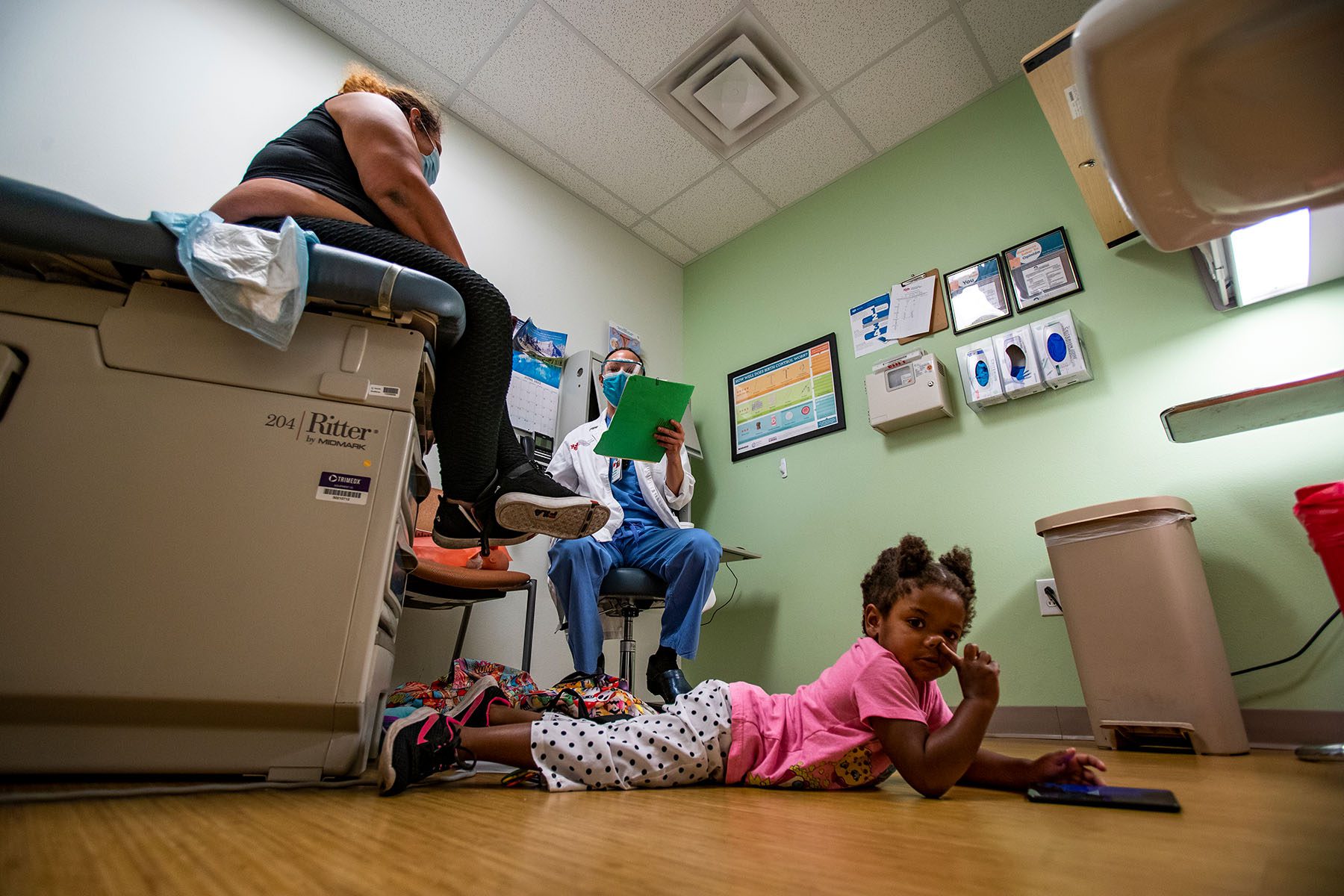
They had been expecting this for months, if not years. Still, many were caught off guard by unanticipated complications and bottlenecks as patient volumes more than doubled overnight. Now, clinicians and abortion funds in all four states say they are underwater, unable to match the overwhelming patient demand they expect will only grow.
“Those of us who have made this our life’s work are really worried. As much as we have tried to prepare and been actively preparing for this, there’s kind of a sense of the unknown,” said Dr. Hillary McLaren, a Chicago-based abortion provider. “I think the need is really going to be huge, and as much as we can consider and map and plan, no one really knows exactly what it looks like.”
The people who will be most harmed, they say, are patients.
Though Trust Women is closed, patients are still trying to make appointments. There are close to 1,000 calls per day, Brink said, with people phoning from states as far as Mississippi and Wisconsin. Even if they were open, it’s more than the clinic could handle. In the newly renovated space, Dr. Christy Bourne, the clinic’s medical director, estimates they’ll be able to provide abortions for 35 patients each day.
The clinic only schedules two weeks out — any further, they worry, runs the risk that patients could find a sooner appointment somewhere else. So they refer patients to other clinics in Kansas, or to providers in Colorado, New Mexico or Illinois. If they booked every patient who called, they’d be full from now until October.
Roe’s fall was forecasted weeks before, when a draft opinion authored by Justice Samuel Alito leaked. But even with that warning, clinics in these four states weren’t fully ready. Abortion providers have scant resources already, and small clinics are now being asked to serve more people than ever. Many clinics were constrained in terms of what, practically, they could do before an official ruling, and caring for patients who have flown in from out of state brings complex new logistical problems that few were able to predict.
Ahead of Roe’s reversal, Chelsea Souder, who runs southern Illinois’ Hope Clinic for Women, prepared physical office expansions. Her staff planned scenarios in which their neighboring states banned abortion. But planning for the crush of patients couldn’t prepare them for actually living it.
Within an hour of the decision, more than 100 people had called Hope Clinic. By the end of the day, that had grown to more than 600. Prior to that, they had averaged 170 phone calls per day. Many callers were from out of state, and didn’t know if abortion was still legal where they lived.
For the next week, it felt as if the phones never stopped ringing. Calls came in from states including Kentucky, Tennessee, Texas, Missouri and Oklahoma. In the past, the clinic had been able to get patients in within a few days. But now, they were facing two-week waits if they wanted a surgical abortion. For a medication abortion, the wait was now three weeks — more than the clinic has ever experienced.
Souder knew she had to hire more people, but she couldn’t: Abortion clinics like hers run on shoestring budgets. While they could predict the looming jump in patients, the clinic couldn’t afford that many new hires until the volume of patients actually increased.
And bringing on more medical personnel is particularly difficult. The past two years of the COVID-19 pandemic have wreaked havoc on the health care system, making it even harder to find staff. That’s to say nothing of the incredibly tight labor market, which has made it difficult for employers to fill job vacancies.
Souder has begun to identify new doctors to work in her clinic. The Hope Clinic is also going to expand from five days of abortion appointments to six. They’re booking 60 patients per day, assuming that maybe 30 to 40 will show up. That’s all they have room for — and that’s with her staff working 10- to 12-hour days.
“The reality is, we’re never going to be able to help every single person that calls us and that is really, really hard for us,” she said. “It’s a hard pill to swallow.”
A post-Roe world doesn’t feel entirely new, clinic leaders said. All had experienced it to some degree after Texas’ six-week ban took effect. But states that were further south — states like New Mexico, Colorado and, until recently, Oklahoma — bore the brunt of it. And yet even with 10 months of experience surviving Texas’ law, plus two months of Oklahoma’s six-week ban, clinics in these states, too, are feeling new layers of strain.
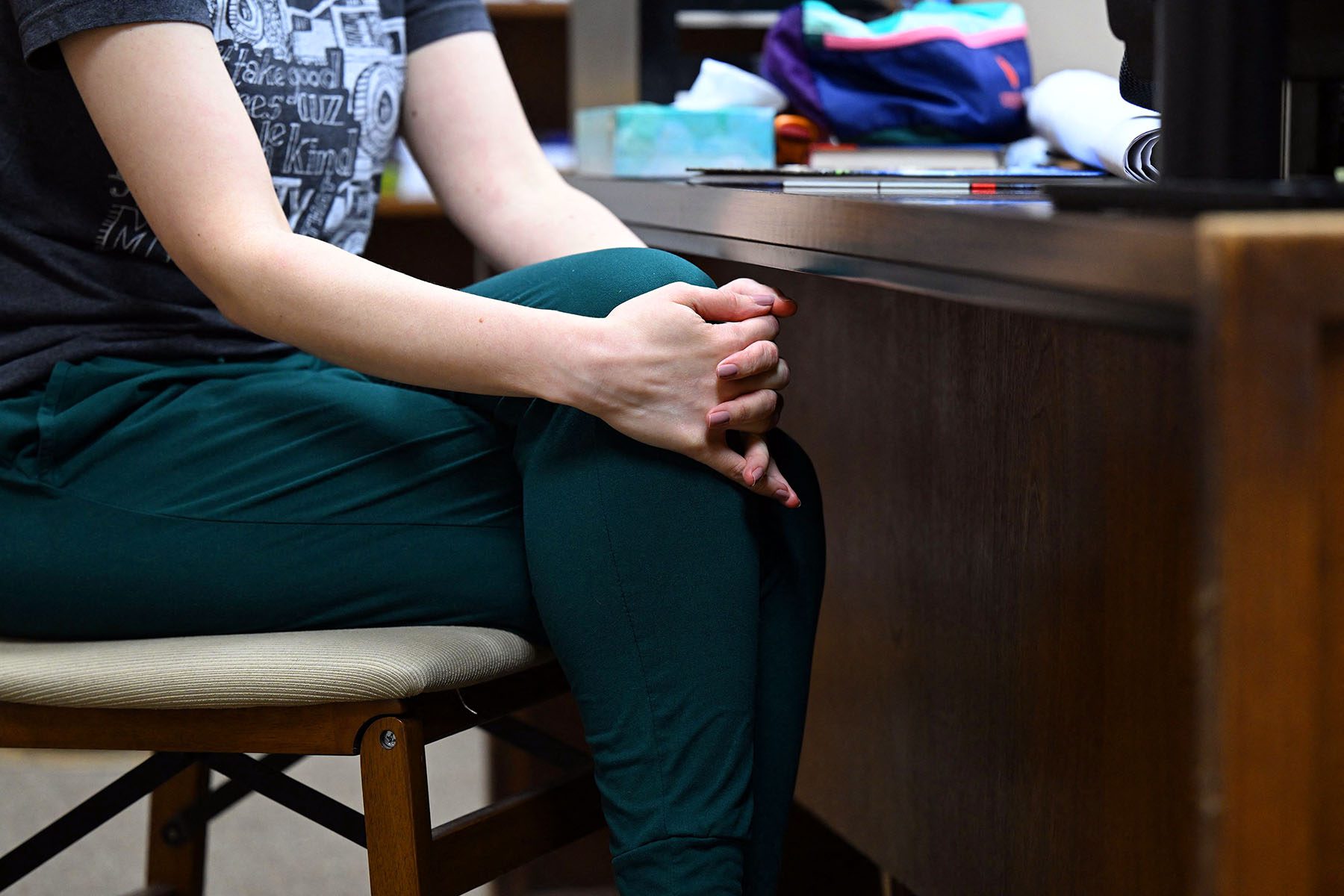
Dr. Eve Espey, a physician at the University of New Mexico Center for Reproductive Health, in Albuquerque, had already been scheduling abortion patients 3 to 4 weeks out — she had been ever since neighboring Texas instituted its six-week abortion ban.
“For us, the end or Roe really happened September 1,” she said. The new world order, she said, “has simply added to that to that volume.”
Her staff provides abortions five days a week, working from 9 a.m. to 6 p.m. Since the court’s decision, the wait time for an appointment has only grown.
“We’re going to keep lengthening our wait times,” Espey said. “People are not going to come off the waiting list.”
In Colorado, phones at the tiny Boulder Valley Women’s Health Center, which offers abortions up to 14 weeks of pregnancy, haven’t stopped ringing the past three weeks.
The day Roe was overturned, staff at the front desk said that they heard voices in the background when speaking to people on the phone: Even as prospective patients sought abortions in Boulder, their partners and families and friends were calling other clinics to see if they might find a sooner appointment.
Before the ruling, but even more so since, the clinic’s waiting room has been full of Texans and Oklahomans who can no longer get an abortion at home. In the weeks to come, said medical director Dr. Kelly Peters, she expects to see more out-of-state patients — from those two states, but also from Utah, where an abortion ban has been temporarily blocked, and from Wyoming, which has a trigger law that is expected to take effect soon.
Travel is up. The Cobalt Fund, Colorado’s largest abortion fund, is now getting 20 to 30 calls a day, three times what they used to receive. The week after Roe fell, Cobalt gave out $13,000 to help people traveling to the state for an abortion, covering flights, hotel rooms, gas money and food. It’s a massive increase: In the preceding seven months, the fund had given out only $6,000 in travel-related support — in total. Many of the patients seeking help don’t have credit cards for a hotel deposit.
At Boulder Valley, it’s already more than the little building — which Peters akins to a small house — can handle. Instead of ending the day at 1 or 2 p.m., they see patients from 8:30 in the morning until 4 in the afternoon. She, too, is facing hiring challenges that make it difficult to expand.
When she came on, her clinic — which provides many other reproductive health services — saw maybe five or six abortion patients on Fridays, the only day they offer the procedure. Right now, they’re scheduling 10 or 12 patients those days, many from out of state. Peters, who is often the only physician present, doesn’t have time to sit, let alone eat lunch.
She isn’t sure how they will sustain the increase in volume. Boulder Valley Women’s Health Center is planning to eventually start offering abortions on Saturdays, too, maybe focusing just on medication abortions if they can’t find enough staff for surgical ones.
“I hate to turn people away,” she said. “And if we end up with that many patients, we’ll do what we can.”
The timelines for providing care are tight. Last week, a patient arrived in the morning from Texas and was scheduled to fly back home by 5 p.m. She had to be at the airport, an hour away from the clinic, by 3 p.m.. The woman was receiving a surgical abortion. In order to make her flight, they skipped providing the sedation often recommended for procedures. It was the only way to make it work.
The deluge of out-of-state patients has thrown clinics and patients into a legal quagmire. Staff and patients alike are unsure about whether providing a medication abortion, even in a state where abortion is legal, could put them in legal jeopardy.
Planned Parenthood’s Montana clinics have stopped offering medication abortions to out-of-state patients because the second of the two pills in the regimen is taken from home, at least 24 hours later. That opens the possibility that it could be taken in a state where abortion is illegal.
There hasn’t been a single criminal charge suggesting that patients or medical providers could be punished for medication abortions provided out of state. But fear of criminal prosecution for providers is a reasonable concern to have, legal experts have told The 19th.
Patients — especially those who have traveled out of state — are increasingly worried about the risks, too, multiple abortion providers told The 19th. And without state intervention, such as a guarantee that the state they’ve visited will protect them from punishment when they return home, physicians are unsure how to address the concern.
The Department of Justice is aware that out-of-state patients are unsure they can get medication abortions, said Jen Klein, who co-chairs the White House Gender Policy Council.
“It is definitely something we’re concerned about,” Klein told The 19th, though it’s not entirely clear what action the federal government can take.
The concern is affecting what kinds of abortions patients get. At Hope Clinic, Souder has noticed a significant number of out-of-state patients newly afraid of getting medication abortions. They worry that, if they bring pills to their home state, they could risk getting caught. And if they have excess bleeding, or if their pain doesn’t abate, they wouldn’t feel safe going to a hospital for follow-up care.
Souder can’t give them a straight answer. She doesn’t know if patients could be prosecuted, or if her staff could be. Some states have passed laws indicating they won’t cooperate with out-of-state investigations; others have governors who have put out executive orders saying as much. Colorado’s executive order has put out such an executive order, though it’s not fully clear how much it protects patients. Illinois’ government has done neither.
Whenever patients asks about legal risks to medication abortion, Souder tells them that they may be safer — from a criminalization standpoint, even if not medically — switching to a surgical procedure. Both forms of abortion are incredibly safe and effective, but research suggests that the risks of complication are lower with medication than with surgery.
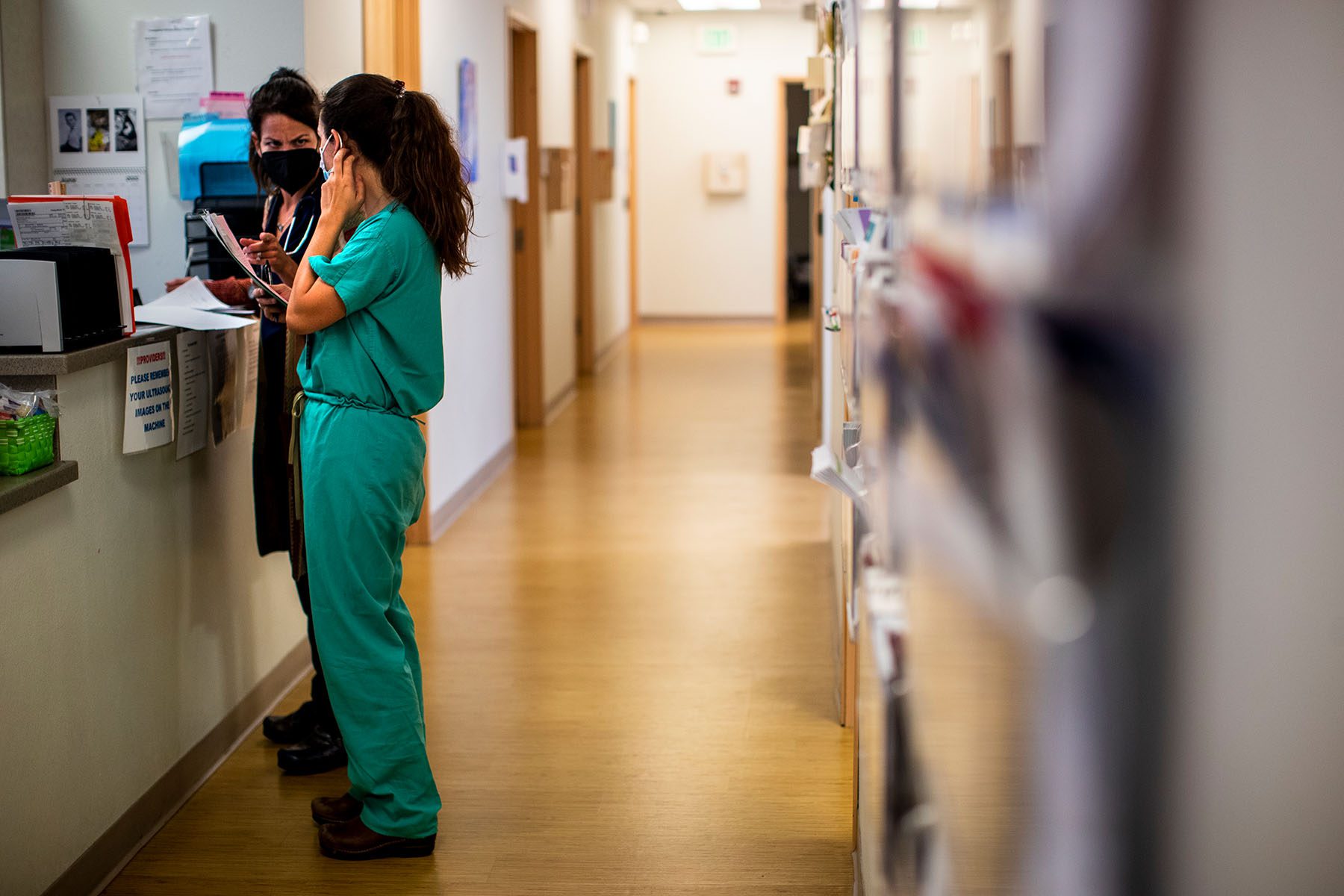
“We don’t have a black-and-white answer,” she said. “We can just tell you what is the least risky option for you of all of them, in terms of legality in your state.”
Patients are raising this concern across clinics – both Brink and Peters said that they don’t have a good answer for patients. There is a real risk that patients could face legal jeopardy if they bring the second pill home with them.
Peters said that, since Roe was overturned, most if not all of her out-of-state patients have opted for surgical abortions, even ones who had originally requested medications. First-trimester surgical abortions are short, but still take a bit longer to perform than giving someone a medication abortion: there is pain medication, after which a medical professional dilates the cervix, and uses a suction tube to remove pregnancy tissue.
The switch from medical to surgical can be difficult on patients, who may have otherwise preferred a medication abortion for any number of reasons — the desire to finish the process from the comfort of home, or nervousness about having their cervix dilated, for instance.
But it also had practical implications, limiting how many patients some clinics can see. Because Boulder Valley provides intravenous sedation to patients getting surgical abortions, those procedures take more time and require more medical personnel. If the surge continues — and if patients remain scared to bring medication abortions home with them — Peters’ capacity will only be stretched further.
And even though her home state has said it won’t cooperate with out-of-state abortion bans, that promise offers little comfort for her patients.
“People are getting more and more concerned. Are [states] going to end up prosecuting patients?” she said. “They’re just worried about what sort of things might happen to them back in their home states if the abortion is illegal.”




